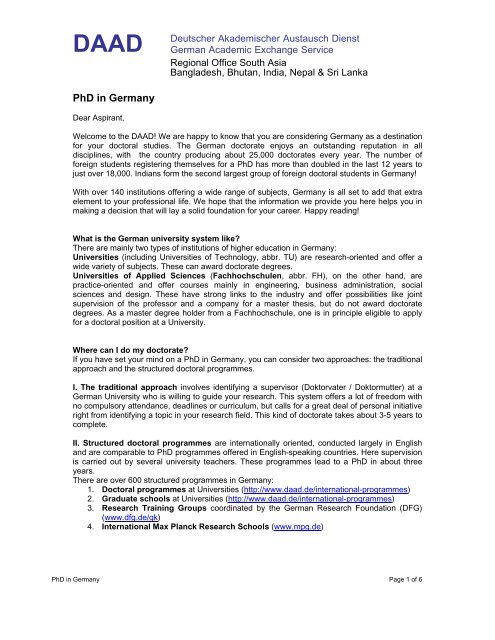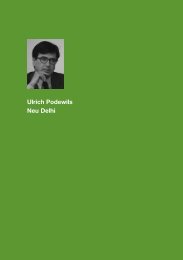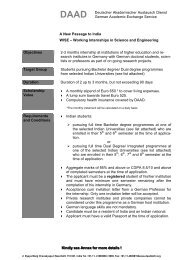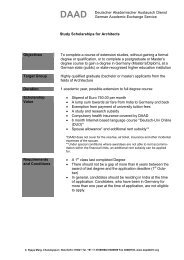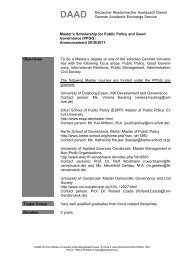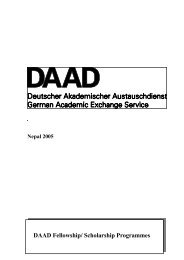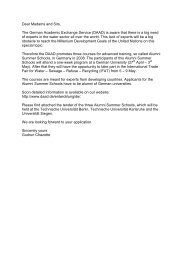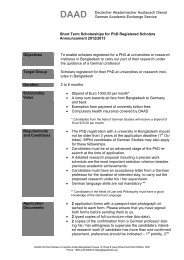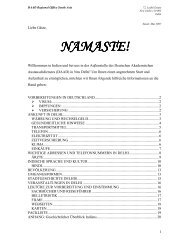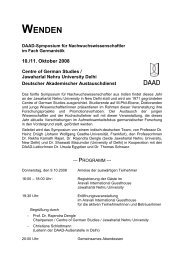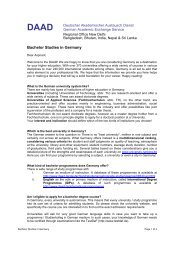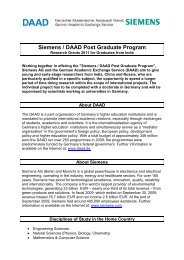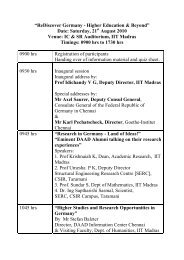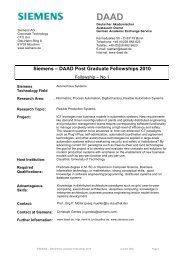Dear aspirant, - DAAD
Dear aspirant, - DAAD
Dear aspirant, - DAAD
You also want an ePaper? Increase the reach of your titles
YUMPU automatically turns print PDFs into web optimized ePapers that Google loves.
<strong>DAAD</strong><br />
PhD in Germany<br />
<strong>Dear</strong> Aspirant,<br />
Deutscher Akademischer Austausch Dienst<br />
German Academic Exchange Service<br />
Regional Office South Asia<br />
Bangladesh, Bhutan, India, Nepal & Sri Lanka<br />
Welcome to the <strong>DAAD</strong>! We are happy to know that you are considering Germany as a destination<br />
for your doctoral studies. The German doctorate enjoys an outstanding reputation in all<br />
disciplines, with the country producing about 25,000 doctorates every year. The number of<br />
foreign students registering themselves for a PhD has more than doubled in the last 12 years to<br />
just over 18,000. Indians form the second largest group of foreign doctoral students in Germany!<br />
With over 140 institutions offering a wide range of subjects, Germany is all set to add that extra<br />
element to your professional life. We hope that the information we provide you here helps you in<br />
making a decision that will lay a solid foundation for your career. Happy reading!<br />
What is the German university system like?<br />
There are mainly two types of institutions of higher education in Germany:<br />
Universities (including Universities of Technology, abbr. TU) are research-oriented and offer a<br />
wide variety of subjects. These can award doctorate degrees.<br />
Universities of Applied Sciences (Fachhochschulen, abbr. FH), on the other hand, are<br />
practice-oriented and offer courses mainly in engineering, business administration, social<br />
sciences and design. These have strong links to the industry and offer possibilities like joint<br />
supervision of the professor and a company for a master thesis, but do not award doctorate<br />
degrees. As a master degree holder from a Fachhochschule, one is in principle eligible to apply<br />
for a doctoral position at a University.<br />
Where can I do my doctorate?<br />
If you have set your mind on a PhD in Germany, you can consider two approaches: the traditional<br />
approach and the structured doctoral programmes.<br />
I. The traditional approach involves identifying a supervisor (Doktorvater / Doktormutter) at a<br />
German University who is willing to guide your research. This system offers a lot of freedom with<br />
no compulsory attendance, deadlines or curriculum, but calls for a great deal of personal initiative<br />
right from identifying a topic in your research field. This kind of doctorate takes about 3-5 years to<br />
complete.<br />
II. Structured doctoral programmes are internationally oriented, conducted largely in English<br />
and are comparable to PhD programmes offered in English-speaking countries. Here supervision<br />
is carried out by several university teachers. These programmes lead to a PhD in about three<br />
years.<br />
There are over 600 structured programmes in Germany:<br />
1. Doctoral programmes at Universities (http://www.daad.de/international-programmes)<br />
2. Graduate schools at Universities (http://www.daad.de/international-programmes)<br />
3. Research Training Groups coordinated by the German Research Foundation (DFG)<br />
(www.dfg.de/gk)<br />
4. International Max Planck Research Schools (www.mpg.de)<br />
PhD in Germany Page 1 of 6
<strong>DAAD</strong><br />
Deutscher Akademischer Austausch Dienst<br />
German Academic Exchange Service<br />
Regional Office South Asia<br />
Bangladesh, Bhutan, India, Nepal & Sri Lanka<br />
Which is the best institution in Germany?<br />
The German answer to this question is: There is no "best university", neither in one subject and<br />
certainly not across all subjects. What Germany offers instead is a multidimensional ranking,<br />
considering various criteria like student and staff judgments on quality of teaching, atmosphere<br />
at the university, library and other equipment, student numbers, average study duration, number<br />
of graduations, third party funding etc. Several tables based on these considerations give you a<br />
detailed picture of the strengths and weaknesses of each university on www.university-ranking.de<br />
Here you can find your programme by selecting a subject, a university or even a city in Germany.<br />
Other recommended rankings can be found on www.dfg.de/ranking and www.humboldtfoundation.de/ranking<br />
.<br />
Am I eligible to apply for a PhD?<br />
In Germany, every university is autonomous. This means that every university / study programme<br />
has its own set of criteria for admitting students. So please check the university website, and<br />
specifically the programme you are interested in to find out the exact admission requirements.<br />
Some generalisation is, however, possible and one can say that as a Master degree holder from<br />
India, your degree is treated at par with a German Master or Magister degree and most<br />
universities will consider you eligible for their doctoral programmes provided you fulfill other<br />
criteria. In some cases, a further examination to assess the eligibility will be required.<br />
Some universities may ask for the proof of your English language proficiency in form of TOEFL or<br />
IELTS scores, while most universities will ask for very good German language skills in case you<br />
have to write your thesis in German. In such cases, your knowledge of German needs to be<br />
certified through examinations like the TestDaF (http://www.testdaf.de ) or DSH.<br />
How do I go about applying?<br />
Step 1: Collect general information from the <strong>DAAD</strong>, internet and brochures.<br />
Attend counseling sessions at the <strong>DAAD</strong> closer to you! We have our<br />
offices in Chennai, Delhi, Mumbai and Pune. For our addresses, please visit<br />
www.daaddelhi.org<br />
Decide which field of research you want to pursue and shortlist potential<br />
universities and professors if you want to follow the traditional<br />
approach or the appropriate structured doctoral programme.<br />
A good place to start is www.daad.de\research-explorer .<br />
The <strong>DAAD</strong> has now come up with PhDGermany – an online portal where<br />
German universities can advertise openings for doctoral positions and<br />
where students can also apply online. Do visit www.phdgermany.de<br />
Academicians from India who have collaborations with German<br />
academicians can be a great source of information too!<br />
PhD in Germany Page 2 of 6
<strong>DAAD</strong><br />
Deutscher Akademischer Austausch Dienst<br />
German Academic Exchange Service<br />
Regional Office South Asia<br />
Bangladesh, Bhutan, India, Nepal & Sri Lanka<br />
Step 2: I. Traditional Approach: Find and convince a supervisor.<br />
Make sure that you approach a potential supervisor the write way and in<br />
good time – a brief and well-structured synopsis of the doctoral thesis is<br />
more likely to get you the right kind of response than a simple email stating<br />
that you are interested in doing a PhD! Communicate information about<br />
your background, academic performance and academic goals.<br />
Get a letter of acceptance from your supervisor.<br />
II. Structured doctoral programme: Identify a programme.<br />
Contact the selected university. This will be your most important source<br />
of information as far as exact details about eligibility, programme<br />
structure, fee, application procedure etc. are concerned.<br />
Check the application deadline for the programme chosen!<br />
Application forms and other relevant material can be downloaded from the<br />
respective university website.<br />
Send the application packet.<br />
Get a confirmation of admission.<br />
Step 3: The Admission procedures vary for different universities and for different<br />
programmes.<br />
Check about these with the university of your choice or your<br />
supervisor.<br />
Make sure you have a valid passport!<br />
Step 4: Apply for a student visa as soon as you have the admission letter, as the<br />
procedure can take around two months. The German Embassy and the<br />
Consulates require proof of funding for the first year of studies (approx.<br />
INR 4-5 lakh).<br />
To find out where you should apply for a visa, visit:<br />
http://www.new-delhi.diplo.de/Vertretung/newdelhi/en/02/Embassy.html<br />
Apply for a place in a hostel. In some cases the International Office<br />
(Akademisches Auslandsamt) of the university will help you.<br />
Step 5: Arrive in Germany at least a week before your course begins.<br />
Contact the International Office (Akademisches Auslandsamt) of your<br />
university for guidance.<br />
Step 6: Get your residence permit within the first three months of your stay in<br />
Germany from the Foreigners’ Registration Office (Auslaenderamt).<br />
Do I need to know German?<br />
As you have already read, Germany offers numerous PhD programmes with English as the sole<br />
or primary medium of instruction and the language for your thesis.<br />
PhD in Germany Page 3 of 6
<strong>DAAD</strong><br />
Deutscher Akademischer Austausch Dienst<br />
German Academic Exchange Service<br />
Regional Office South Asia<br />
Bangladesh, Bhutan, India, Nepal & Sri Lanka<br />
In any case, as a student in Germany, your life will not be limited to the university campus. You<br />
will surely want to interact with people, travel through the country-side and make the best of your<br />
time there. This is where knowledge of German will present a great advantage!<br />
Universities offer beginner and well as advanced level courses where you can learn German. But<br />
you can start learning the language while you are still in India at one of the Goethe-Instituts (Max<br />
Mueller Bhavans) / Goethe-Zentrums http://www.goethe.de/ins/in/lp/enindex.htm<br />
What kind of budget should I have in my mind?<br />
As a doctoral student, you are expected to pay special semester contribution to the tune of Euro<br />
50 to 250, depending upon the university and the services or benefits provided. Doctoral students<br />
are generally exempted from tuition fees for the first six semesters. Thus, in Germany virtually<br />
every doctoral student gets a scholarship!<br />
Apart from the semester contribution, you will require about Euro 740 (approx. INR 45,000) per<br />
month for subsistence i.e. housing, food, clothing, study material and other expenses such as<br />
health insurance and leisure activities. This amount can vary from city to city, and of course from<br />
lifestyle to lifestyle!<br />
How can I finance my doctorate?<br />
If you are participating in a structured doctoral programme and doing your doctorate at a graduate<br />
school, research centre or research training group, the issue of funding is usually resolved with<br />
you either working as a research assistant or receiving a scholarship of about Euro 1000 per<br />
month.<br />
If you are pursuing your doctorate on the basis of the traditional approach, you can apply for a job<br />
as a research assistant, if there is vacancy.<br />
Working as a research/doctoral assistant involves collaboration in research/teaching and doing<br />
administrative work in addition to completing the dissertation. Non-university institutions like<br />
Fraunhofer Institutes and also some companies offer doctoral candidates employment and / or<br />
fund their doctoral dissertations.<br />
Are there any scholarships available?<br />
The <strong>DAAD</strong> offers the most extensive scholarship programme. It supported 2,580 international<br />
doctoral candidates in 2008. Also a number of foundations support international candidates<br />
approved for the doctoral process. A database of scholarships offered by various German<br />
organizations can be found at www.funding-guide.de<br />
What is a <strong>DAAD</strong> Scholarship like and how can I apply for it?<br />
Step 1: Collect general information about <strong>DAAD</strong> scholarships available from<br />
www.daaddelhi.org Thoroughly check the eligibility criteria.<br />
Attend counseling sessions at the <strong>DAAD</strong> closer to you! We have our<br />
offices in Chennai, Delhi, Mumbai and Pune. For our addresses, please visit<br />
www.daaddelhi.org<br />
PhD in Germany Page 4 of 6
<strong>DAAD</strong><br />
Deutscher Akademischer Austausch Dienst<br />
German Academic Exchange Service<br />
Regional Office South Asia<br />
Bangladesh, Bhutan, India, Nepal & Sri Lanka<br />
Step 2: Once you have the letter of acceptance from your supervisor/admission<br />
letter from your university, check our website www.daaddelhi.org for<br />
application details.<br />
The application deadline is 1 st October of the current year for a PhD<br />
beginning in the next year.<br />
Step 3: If your application gets shortlisted, you will be invited for a personal<br />
interview at the <strong>DAAD</strong> Regional Office New Delhi around end of November.<br />
Step 4: If you clear the interview, you have to attend a mandatory 6-month German<br />
language course, which is a necessary and important part of your<br />
scholarship (2 months in India + 4 months in Germany).<br />
Step 5: Upon successful completion of the language course in India, you will leave<br />
for Germany and attend the 4-month advance level German language<br />
course.<br />
Step 6: After the successful completion of your language course in Germany, your<br />
PhD will begin in October.<br />
To get a comprehensive overview of various funding possibilities, please visit www.fundingguide.de<br />
Can I work in Germany – as a student and later as a professional?<br />
As mentioned, you can work as a research assistant, in which case, you will not face much of<br />
restrictions in terms of hours you put into working.<br />
However, if you are doing a part-time job somewhere else, you are permitted to work for up to 90<br />
full days or 180 half-days in a year. This will help you in getting a bit of extra pocket-money.<br />
After completing your degree in Germany, you can stay on in the country for up to one year to<br />
look for a job that is in keeping with your education. Once you find a job, the residence permit<br />
issued to you for the purpose of studying, can be converted into a residence permit for taking<br />
gainful employment.<br />
In Germany, a doctorate is a prerequisite for a career in research or higher education. Your<br />
options include:<br />
Teaching/Research Assistantships<br />
Postdoc Positions<br />
Research Positions in Industry<br />
The portal www.academics.com has Germany’s biggest online job market for researchers.<br />
There are also scholarships for Postdocs offered by the Alexander-von-Humboldt Foundation<br />
(www.avh.de ) and other organizations.<br />
PhD in Germany Page 5 of 6
<strong>DAAD</strong><br />
Deutscher Akademischer Austausch Dienst<br />
German Academic Exchange Service<br />
Regional Office South Asia<br />
Bangladesh, Bhutan, India, Nepal & Sri Lanka<br />
We hope that with this information you have a fair overview of higher education in Germany and<br />
what you have to do to get there. If you want to know more about universities and student life or<br />
read what other international students have to say about Germany, surf on www.study-in.de ,<br />
www.research-in-germany.de and blog.scholarz.net<br />
...And we must mention, that your reading of this document is not complete unless you have also<br />
visited the websites we have provided you with!<br />
Wishing you all the very best for your future,<br />
<strong>DAAD</strong> New Delhi<br />
PhD in Germany Page 6 of 6


